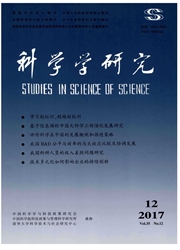

 中文摘要:
中文摘要:
政府科技资助是解决企业研发活动外部性问题、推动创新驱动发展的重要手段。基于我国2009-2014年大中型工业企业数据,探讨直接补贴资助、直接税收优惠和间接税收优惠三种科技资助方式对企业研发投入的影响,并分析知识产权、企业规模、产权类型、知识存量和R&D资本存量等因素的调节作用。研究发现三种科技资助对企业研发投入均有显著激励效应,且直接税收优惠的最强,但知识产权保护的调节效应不显著。政府对小规模企业、非国有企业科技资助的激励效应比对大规模企业、国有企业强。对R&D资本存量、知识存量大的企业,直接税收优惠的激励效应更强,反之则直接补贴资助、间接税收优惠的更强。
 英文摘要:
英文摘要:
Public ST subsidies are important means to solve the externality of corporate RD activities and promote the innovation-driven development. Based on the data of large and medium-sized industrial enterprises in China during 2009 to 2014,this paper explores the effects of three kinds of ways,including direct subsidies,direct tax credits and indirect tax credits,of public ST subsidies on private RD expenditure,and also analysis the moderating effects of other factors like intellectual property right protection,enterprise scale,property types,knowledge stocks and RD capital stocks. The research found that all three kinds of public ST subsidies have significant positive effects on private RD expenditure,especially for direct tax credits,which has the strongest. However,the moderating effect of intellectual property right protection is not significant. The positive effects of public ST subsidies on small scale enterprises and private enterprises are stronger than large scale enterprises and state-owned enterprises. The direct tax credits has a stronger positive effect on those corporate who has large RD stocks and knowledge stocks,and the direct subsidies and indirect tax credits have stronger incentive effect on those has small one.
 同期刊论文项目
同期刊论文项目
 同项目期刊论文
同项目期刊论文
 期刊信息
期刊信息
